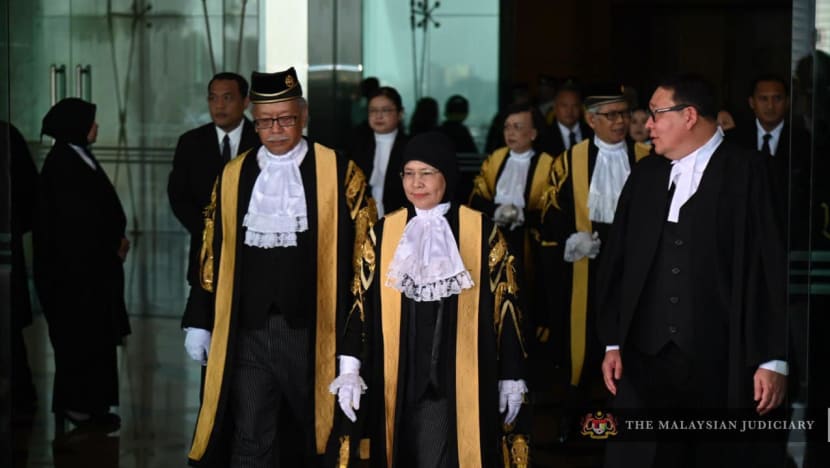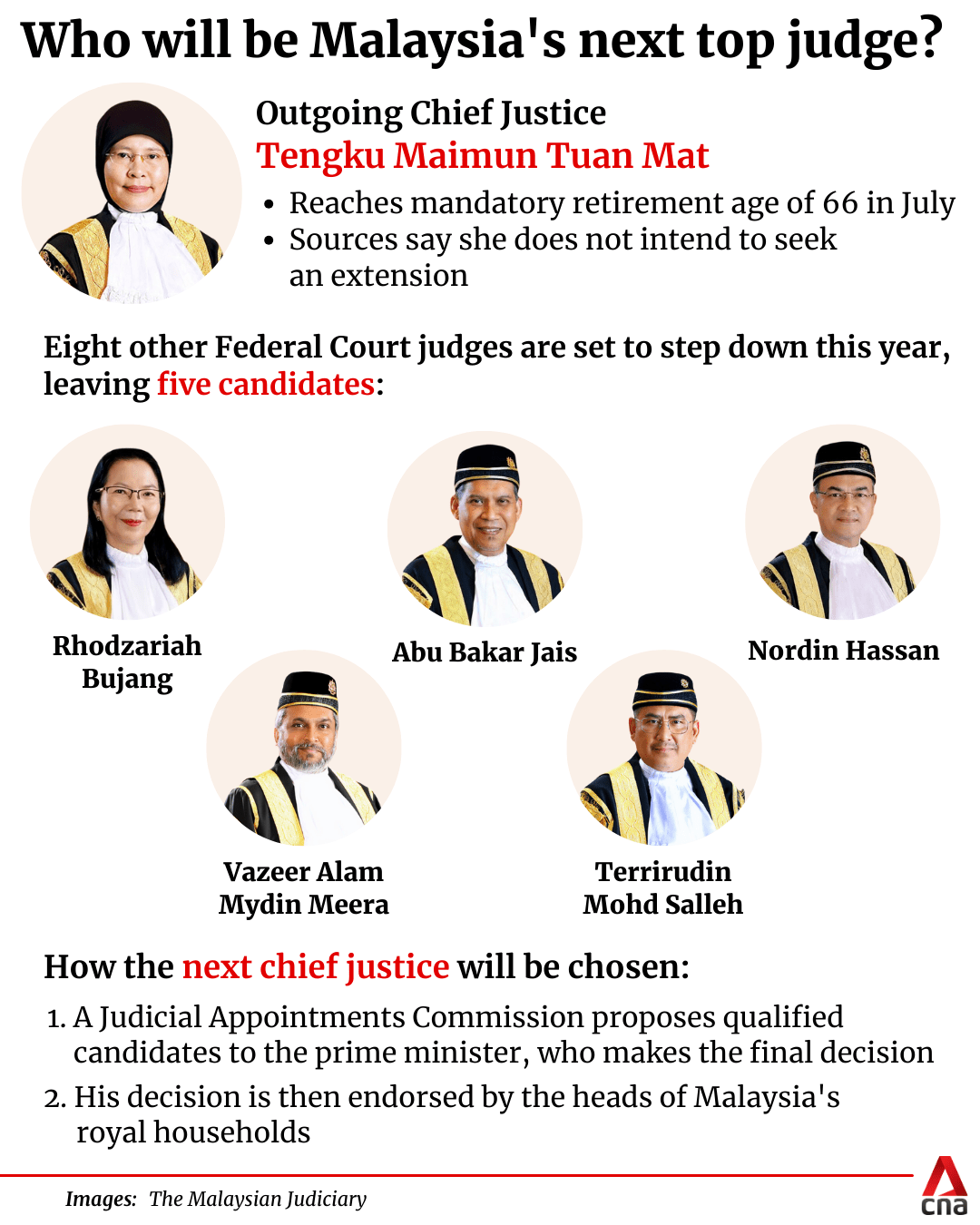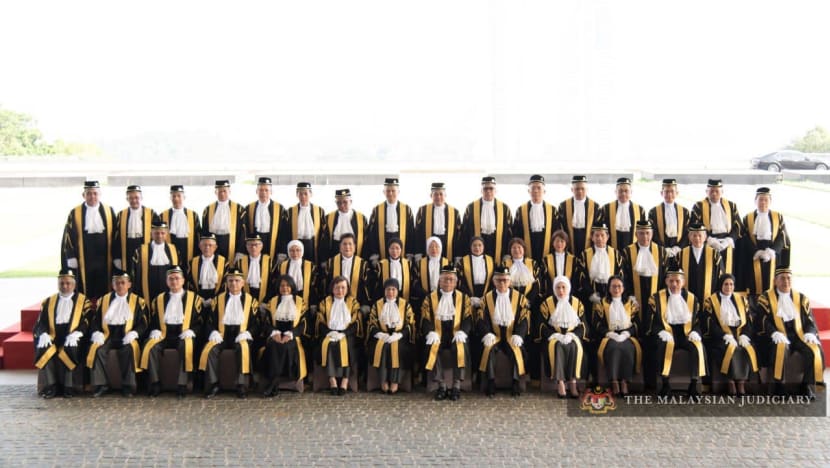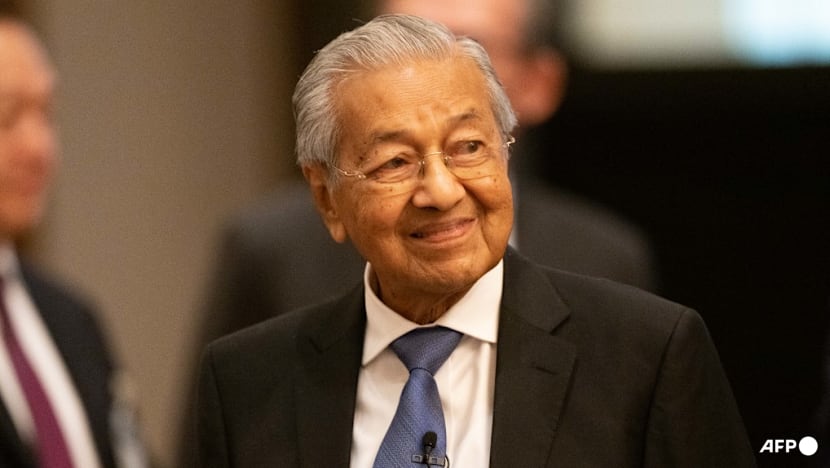analysis Asia
Upcoming leadership changes in Malaysia’s judiciary stir concerns of political intervention
Several judges of the Federal Court, Malaysia's highest judicial body, are due to retire and the legal fraternity is concerned senior judges may be bypassed in favour of politically linked candidates for new appointments.

Malaysia's Chief Justice Tengku Maimun Tuan Mat (centre) at the Opening of the Legal Year on Jan 8, 2025. (Photo: Facebook/The Malaysian Judiciary)

This audio is generated by an AI tool.
KUALA LUMPUR: A leadership transition is set to strike at the heart of Malaysia’s judiciary in the coming months and how the government pushes ahead with new appointments could have far-reaching ramifications for the institution.
Nine of the 14 judges of the Federal Court, the country’s apex judicial body, will hit the retirement age in the coming months and senior lawyers noted there are already rumblings of possible political interference in the soon-to-be made appointments.
“The talk among judges is that the hierarchy system could be set aside for some of the top positions because the politicians want to wield influence (over the judiciary),” said a senior partner of a large Malaysian law firm, who requested anonymity for fear of any retribution on his practice because of the extensive work its does for the government.
Zaid Ibrahim, Malaysia’s former law minister, also told CNA: “What worries many of us is whether the Prime Minister's choice will result in the judiciary having the best jurist for the job or will it be the best for the PM.”
WHO WILL BECOME THE NEXT CHIEF JUSTICE?
All eyes are on how Prime Minister Anwar Ibrahim’s administration moves ahead with the replacement of Chief Justice Tengku Maimun Tuan Mat, the country’s first female chief justice, who reaches the retirement age of 66 on July 2.
Tengku Maimun is highly regarded by the legal fraternity and is credited with burnishing the reputation of the judiciary after what some perceive to be years of blemish.
Senior judges are typically granted a six-month extension when they reach retirement age.
But close associates of Tengku Maimun and people in Anwar’s inner circle have noted that the country’s No. 1 jurist has made clear to the premier that she is not keen on an extension.
With eight other Federal Court judges also set to retire in the coming months, the selection of the next Chief Justice will narrow down to five Federal Court judges: Rhodzariah Bujang, Abu Bakar Jais, Nordin Hassan, Vazeer Alam Mydin Meera and Terrirudin Mohd Salleh.
These five judges will also be in contention for three other key positions that will become vacant in the coming months, also because of retirements.
The seats are for the President of the Court of Appeal, the Chief Judge of Malaya, who oversees the country’s 60 High Court judges, and Chief Judge of Sabah and Sarawak, who supervises another 13 High Court judges in two East Malaysian states on Borneo.
In Malaysia’s superior courts, the Federal Court sits above the Court of Appeal, which is in turn above the High Court of Malaya and the High Court of Sabah and Sarawak. They are followed by the subordinate courts, which comprise the Sessions Court and the Magistrates Court.
Except for judge Terrirudin – Malaysia’s former Attorney General who was appointed to the Federal Court in November 2024 with the backing of Anwar and is its most junior jurist – the other four candidates are of comparable seniority.
So, their appointments to any of the key positions in the judiciary are not likely to raise any eyebrows, noted lawyers.

HOT-BUTTON ISSUE
The fraternity’s unease stems from talk that Terrirudin, who is 57 years old, is being promoted by politicians and segments of the royal households to be the next Chief Justice.
Lawyers noted that they have been informed by judges that the speculation among senior jurists is that PM Anwar appears to be leaning in favour of the former Attorney General.
The Prime Minister’s Office did not respond to a request for comment.
Malaysia established a Judicial Appointments Commission (JAC) in 2009 that proposes qualified judicial candidates to the prime minister, who makes a final decision. His decision is then endorsed by the heads of the country’s royal households who make up the Conference of Rulers.
The JAC Act was meant to ensure that the selection process of judges would be unbiased, but lawyers noted that, in practice, new appointments often attract intense lobbying by politicians and segments in Malaysia’s royal households.

In her message at a conference for the judiciary last month, Tengku Maimun acknowledged that the JAC was far from perfect.
She also issued what appeared to be a veiled warning against any outside interference in the appointment of judges and added that any form of circumvention of the law “would render those appointments (of judges) either unconstitutional or in breach of written law”.
“For this reason, no person, whether it be the president of the Malaysian Bar, any advocate or solicitor, any political party, the Attorney General, or any other person for that matter, has any business recommending names to the PM for appointment,” she said at the opening of the legal year on Jan 8.
Responding to her speech on Jan 23, nine former presidents of the Malaysian Bar said the country’s current administration falls behind its past three governments when it comes to valuing and respecting judicial independence.
Government-elected representatives are also calling for a revamp of the JAC Act.
Ramkarpal Singh, a Member of Parliament from the Democratic Action Party, which is a coalition partner in Anwar’s government, said there was a need to overhaul the selection process of judges. He also wants the provision allowing the prime minister to reject recommendations made by the JAC to be scrapped.
“The JAC appointments process needs urgent reform to ensure that the perception of executive influence in appointing judges is eliminated,” said Ramkarpal, a former deputy law minister, as quoted by the local media.
MALAYSIA’S JUDICIARY AT CROSSROADS, SOME SAY
Lawyers and retired judges noted that Malaysia's judiciary is at a crossroads.
“Any move to appoint someone who is junior and who was parachuted in would send a bad signal to the institution and investors. It would be dialing back to the dark years,” noted a retired jurist, who spoke on the condition of anonymity, of the widening speculation that Terrirudin could be promoted to the top judicial job.
The so-called “dark years” refer to the jousting between former premier Mahathir Mohamad and the judiciary in 1988 when Mahathir sacked the then-top jurist Salleh Abas and dismissed two other Federal Court judges who held court hearings to defend their brother judge.
The late Salleh’s dismissal came after he claimed Mahathir was meddling in the judiciary by coming up with amendments to curtail its powers.
At the time, the judiciary was widely considered to be relatively independent.

Relations between the two reached a boil when Salleh – who was then lord president of the supreme court, a title equivalent to that of chief justice – showed signs that he would preside over a panel of seven Federal Court judges and rule against a Mahathir-led faction in a case involving a controversial election of the then-ruling United Malays National Organisation (UMNO) party.
Mahathir won the battle when a tribunal he convened removed Salleh from office, and critics say the premier went on to pack the courts with government-friendly judges and consolidated his political power.
After Abdullah Ahmad Badawi took over as PM from Mahathir in 2003, Salleh and other voices called for a review of the judges’ sacking in the 1988 judicial crisis.
For his part, Mahathir has denied allegations that he meddled with the judiciary.
ARENA TO SETTLE SCORE
In the ensuing years, the courts would be seen as an arena to settle political scores.
A decade after the tumult in the judiciary, political trouble would return with the fight between Mahathir and his then-deputy Anwar that began with differences over how to manage the regional economic crisis triggered by the collapse of the currency market in Thailand and later spread to Indonesia and then to Malaysia.
Anwar was sacked and later convicted of corruption and sexual misconduct charges with long jail sentences in court cases that were widely criticised by international legal watchdog groups and human rights organisations.
Mahathir and successive UMNO-led coalition governments also took other opponents to court, and the judiciary attracted more controversy when politically connected businessmen brought legal disputes before judges of their choice.
Often cited is the so-called Ayer Molek affair, where a government-backed bailout in 1995 of a troubled financial institution turned into a nasty court battle with business protagonists and lawyers involved accused of judge-fixing. The episode led to a public confrontation between the country’s Bar Council and the then-chief justice Mohamed Eussof Chin.
A royal commission of inquiry was set up to probe the matter in 2008 but very little came out of the inquest.
The spectacular collapse of the UMNO-led coalition government in the May 2018 general election opened the doors to reforms in the judiciary.
Tengku Maimun was appointed as Chief Justice of the Federal Court in May 2019 and lawyers said that under her leadership, the courts have delivered important decisions in the face of stiff pushback from politicians.
The decisions, they cited, include the conviction and jailing of former premier Najib Razak for corruption and the ongoing graft trials of his wife Rosmah Mansor.
Tengku Maimun and her team of Federal Court judges have also not shied away from pushing back against the encroachment of Sharia jurisdiction.
But recent judicial appointments have caused disquiet in legal circles, CNA has reported.
The appointment last November of Hasnah Mohammed Hashim as Chief Judge of the High Court of Malaya – the third highest judicial position in the country – appeared to have bypassed the JAC, a lawyer told CNA previously.
Terrirudin’s appointment as a Federal Court judge may also not have gone through the JAC, which lacked a quorum at the time, a former Court of Appeal judge noted.
“Tengku Maimun has established sound legal precedents, but a new team of ‘reformists’ could easily sidestep them in favour of the new ideology,” said former law minister Zaid.

















